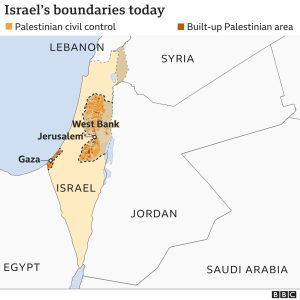The Israeli-Palestinian conflict is a long-standing and deeply complex issue that has captivated the attention of the international community for decades. This protracted struggle has resulted in immense human suffering and has resisted numerous attempts at resolution. This article delves into the historical roots, key players, and the elusive quest for a lasting peace in the never-ending struggle between Israel and Palestine.
Historical Background

To understand the Israeli-Palestinian conflict, we must first examine its historical roots. The dispute can be traced back to the late 19th century when Jewish immigration to Palestine increased significantly, driven by Zionist aspirations for a homeland. After World War I, the League of Nations granted Britain a mandate over Palestine, which fueled tensions between Jewish immigrants and the Arab majority.

In 1947, the United Nations proposed a plan to partition Palestine into separate Jewish and Arab states, with an internationalized Jerusalem. This partition plan was accepted by Jewish leaders but rejected by Arab states, leading to the first Arab-Israeli war in 1948. This war resulted in Israel’s declaration of independence and the displacement of hundreds of thousands of Palestinian Arabs, laying the foundation for future conflicts.
Key Players
The Israeli-Palestinian conflict involves multiple actors, each with their own interests and narratives:
1. Israel: Established in 1948, Israel has since developed into a modern, prosperous nation with a vibrant democracy. Its government seeks security and recognition as a Jewish state within secure borders.
2. Palestine: Palestinians, particularly in the West Bank and Gaza Strip, aspire to establish an independent state of their own. However, political divisions between Fatah and Hamas have hindered their efforts for unity.
3. The United States: As a close ally of Israel, the U.S. has played a significant role in the conflict, often supporting Israel diplomatically, financially, and militarily. However, American administrations have also been involved in peace negotiations.
4. Arab States: Arab nations in the region have historically supported the Palestinian cause, but some have shifted their priorities in recent years due to changing geopolitical dynamics.
5. International Community: Organizations like the United Nations and the European Union have been involved in mediating peace talks and providing humanitarian aid to Palestinians.
The Elusive Quest for Peace
Despite numerous peace initiatives and negotiations, a lasting solution to the Israeli-Palestinian conflict remains elusive. Several factors contribute to the ongoing struggle:
1. Territorial Disputes: The main sticking point revolves around borders, settlements, and the status of Jerusalem. Both sides have deep historical and religious connections to these areas, making compromise difficult.
2. Security Concerns: Israel is concerned about its security and insists on maintaining control over certain territories to prevent potential threats. Palestinians argue that these security measures infringe upon their rights and sovereignty.
3. Refugee Issue: The right of return for Palestinian refugees who were displaced during the 1948 war is a contentious issue. Israel rejects a full right of return, fearing it would alter the demographic balance.
4. Political Divisions: Internal divisions within the Palestinian leadership, particularly the ongoing rivalry between Fatah and Hamas, have hindered their ability to negotiate as a unified front.
5. External Influences: The involvement of outside actors, such as the United States and Arab states, can sometimes complicate peace negotiations, as they pursue their own interests and agendas.
The Israeli-Palestinian conflict is a deeply entrenched and multi-faceted issue that has defied resolution for decades. Despite the pain and suffering it has caused on both sides, the pursuit of peace remains a distant goal. However, it is essential to remember that there have been moments of hope and progress throughout history, and a peaceful resolution is not entirely out of reach. It will require the commitment of all parties involved, as well as the support of the international community, to find a just and lasting solution to this never-ending struggle.



